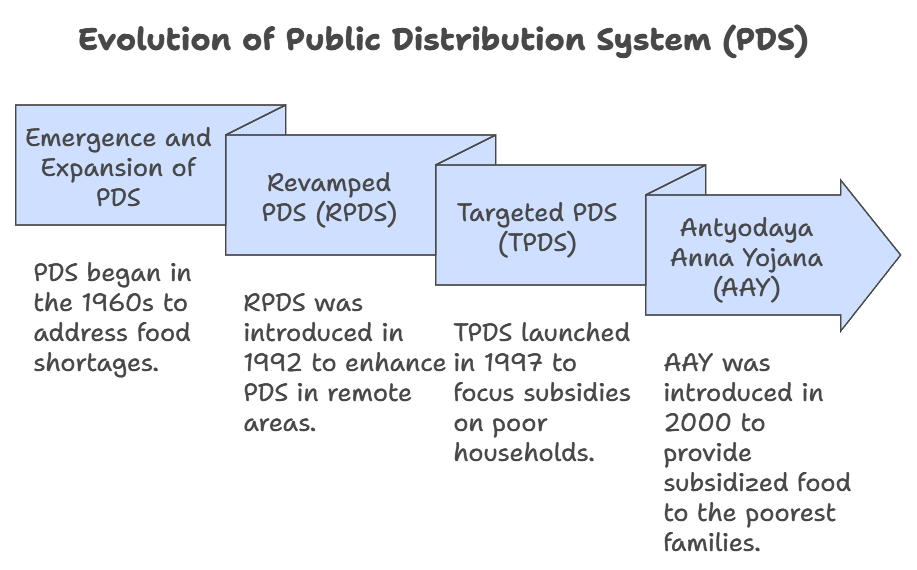Important Facts For Prelims
Digital Platforms to Enhance India’s PDS System
- 11 Jun 2025
- 7 min read
The Union Minister for Consumer Affairs, Food and Public Distribution has launched 3 digital initiatives- Depot Darpan Portal, Anna Mitra Mobile App, and Anna Sahayata Grievance Redressal System.
- These initiatives aim to improve transparency, efficiency, and accessibility within India's Public Distribution System (PDS), benefiting over 81 crore people under the National Food Security Act.
What are Depot Darpan Portal, Anna Mitra Mobile App and Anna Sahayata?
- Depot Darpan Portal: Depot Darpan is a self-assessment and monitoring portal for food grain depots managed by the Food Corporation of India (FCI) and Central Warehousing Corporation (CWC).
- Key Features:
- Tech-Driven Ratings: It uses a composite rating system evaluating occupancy, profitability, storage efficiency, safety, environmental sustainability, and statutory compliance, supported by IoT sensors, CCTV, live video feeds, and real-time analytics.
- The portal is expected to result in Rs 275 crore in savings for FCI and generate Rs 140 crore additional revenue for CWC by optimizing storage space and operations.
- Key Features:
- Anna Mitra App: Anna Mitra is a mobile app designed for Fair Price Shop (FPS) dealers, District Food & Supply Officers (DFSO), and Food Inspectors under the Public Distribution System (PDS).
- Key Features:
- Role-Based Functionalities: It enables FPS dealers to track stock receipts, sales, and alerts; DFSO to monitor FPS performance, handle grievances, and access beneficiary data; and inspectors to conduct geo-tagged inspections.
- Aimed at enhancing transparency and accountability, the app is piloted in Assam, Uttarakhand, Tripura, and Punjab, and is available in Hindi and English.
- Key Features:
- Anna Sahayata Platform: Anna Sahayata is a grievance redressal platform for beneficiaries of PMGKAY and the National Food Security Act (NFSA), 2013, covering over 81 crore people.
- It enables grievance registration via WhatsApp, IVRS, and Automatic Speech Recognition (ASR), improving accessibility, accountability, and efficiency.
What is the Public Distribution System (PDS)?
- About: The PDS is a food security mechanism that provides essential foodgrains at subsidized rates to vulnerable populations.
- It is governed by the NFSA, 2013 covering about two-thirds of the population based on Census 2011.
- PDS mainly supplies wheat, rice, sugar, and kerosene, with some states also distributing pulses, edible oils, and salt.
- Implementation: Jointly managed by the Centre and States/UTs, the Central Government (through FCI) overseas procurement, storage, transportation, and bulk allocation of foodgrains.
- While State Governments handle local distribution, beneficiary identification, ration card issuance, and Fair Price Shop (FPS) operations.
- Initiatives to Reform India's PDS:
- Anna Chakra is a supply chain optimization tool for the PDS to reduce transport distances by 15–50% and save Rs 250 crore annually.
- SCAN (System for Computerized Allocation and Notification) streamlines food subsidy claims through a unified, automated, rule-based portal.
- One Nation One Ration Card (ONORC)
- Technology-Driven Reforms in PDS:
- SMART-PDS Scheme (2023–2026) to upgrade technology in End-to-End Computerization and Integrated Management of PDS (ImPDS).
- Computerized FPS and use of POS machines for real-time authentication and tracking of grain distribution.
- Aadhaar linkage improves beneficiary identification; DBT enables cash transfers.
- GPS tracking of grain delivery and SMS alerts to update citizens on dispatch and arrival.
UPSC Civil Services Examination, Previous Year Question (PYQ)
Prelims
Q.1 In the context of India’s preparation for Climate-Smart Agriculture, consider the following statements: (2021)
- The ‘Climate-Smart Village’ approach in India is a part of a project led by the Climate Change, Agriculture and Food Security (CCAFS), an international research programme.
- The project of CCAFS is carried out under Consultative Group on International Agricultural Research (CGIAR) headquartered in France.
- The International Crops Research Institute for the Semi-Arid Tropics (ICRISAT) in India is one of the CGIAR’s research centers.
Which of the statements given above are correct?
(a) 1 and 2 only
(b) 2 and 3 only
(c) 1 and 3 only
(d) 1, 2 and 3
Ans: (d)
Q.2 With reference to the provisions made under the National Food Security Act, 2013, consider the following statements: (2018)
- The families coming under the category of ‘below poverty line (BPL)’ only are eligible to receive subsidized food grains.
- The eldest woman in a household, of age 18 years or above, shall be the head of the household for the purpose of issuance of a ration card.
- Pregnant women and lactating mothers are entitled to a ‘take-home ration’ of 1600 calories per day during pregnancy and for six months thereafter.
Which of the statements given above is/are correct?
(a) 1 and 2 only
(b) 2 only
(c) 1 and 3 only
(d) 3 only
Ans: (b)







